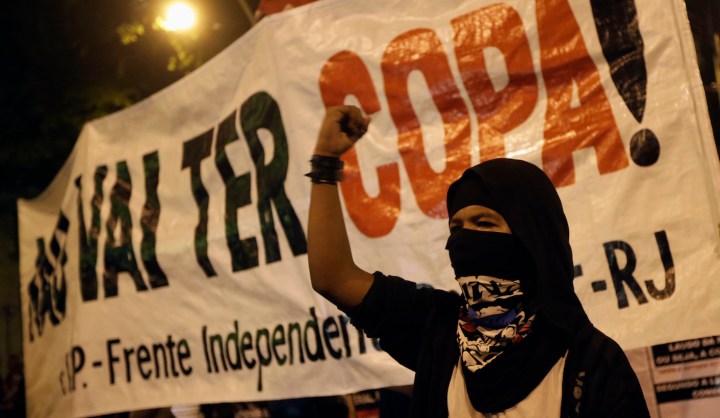Sport
Brazil’s World Cup and misplaced priorities

Just like South Africa back in 2010, unrest and panic continues to grow ahead of the World Cup in Brazil. In an economically divided country, there is increasing concern that public money being spent on satisfying Fifa is not going to benefit anyone in the long run. By ANTOINETTE MULLER.
The screaming headlines about failing infrastructure, protests, poverty and stadiums not being ready on time might seem familiar to anyone who followed the lead-up to the 2010 Soccer World Cup in South Africa. Just like in 2010, Brazil is also struggling to complete work ahead of the event. Out of the 11 stadiums which were due to be completed in December last year, three still need work done.
Over the weekend, a stadium in Manaus was given a test run and, as expected, made for great tabloid fodder, with some describing it as “horrific”.
Bathrooms were incomplete and there were leaks from parts of the roof. Fans also complained of long lines to purchase food at concession stands and said tickets were sold for seats that did not exist. Organisers said that they were aware that some of these problems existed and would be working around the clock to solve them. Two more test matches are due to be played at the venue before the global showpiece kicks off in June.
But those are not the only problems facing Brazil. It is a vastly economically divided country where the poor face struggles of long bus commutes to work and many of the promised infrastructure projects have been cancelled. When the country was awarded the competition back in 2007, officials promised that around $8 billion would be spent on new airports, subways and other projects, while an additional $3.5 billion was to be spent on renovating existing stadiums. Many of the promised infrastructure projects have not been completed or won’t be ready on time.
A subway was planned in Belo Horizonte, but was cancelled and replaced with bus lanes instead. In the same city, a new international terminal at the airport was cancelled. In Salvador, subway construction was handed over to a private company and will not be finished until the tournament is over. At Rio de Janeiro’s main airport, a new runway was proposed, but it’s not even certain whether it will be finished in time for the 2016 Rio Olympics. And lastly, the monorail system which was due to “revolutionise transportation in the Amazon jungle city of Manaus” was found to not be no longer viable.
It is no surprise that protests occurred around the country last year and that locals are growing increasingly frustrated, not just about the lack of progress, but also about the seeming waste of money.
“They started late and have boxed themselves in. Now they have to redouble efforts to finish stadiums, so much of the good stuff gets left behind,” said Victor Matheson, a sports economist at the College of the Holy Cross in Worcester, Mass., in an interview with The Associated Press. What was important gets pushed off, and what’s urgent gets done,” Matheson added.
Contradictions and corruption is also an issue and in 2011, former Sports Minister, Orlando Silva, hailed the tournament as an opportunity for Brazil to show that it is “an innovative and modern nation”. Just a few months later he was removed from office amid accusations he took kickbacks.
Angry residents have also spoken out about the situation, especially with regard to a sum of public money spent on what are likely to end up as white elephants in the near future.
“People say Brazil is an emerging country, but it’s emerging from nothing,” says Luciano Cardoso, a residents’ association leader. “We’re 88th in the world for education. In my opinion, the World Cup gives no benefits at all because 70 percent of the spending on works is public money. So why didn’t they do it before if they had so much money to invest, to give to Fifa, as a donation?”
“The problem is the ‘Fifa standard’,” Claudia Favaro, representative of the Popular Committee in Porto Alegre explains.
“It doesn’t give anything back to the country. The organisation of a country is down to the state, to the government. But they put public money into delivering a standard that Fifa requires. Our stadiums are excellent, but they have to have everyone seated, everything formal.”
The euphoria many Brazilians experienced when the country was announced as World Cup host continues to fade and support for hosting the competition has gone from 80 to just 50 percent. As much as £475 has been spent on security to ensure that 170,000 troops patrol the streets should tensions flare up again.
Like the Sochi Olympics, many have been displaced in order to make room for infrastructure. Those who were removed were given compensation of £13,000, but the cost of a home of the same standard has risen by as much as £20,000.
Legacy is a word often bandied about when tournaments such as a World Cup is hosted, but for the ordinary Brazilian, there will be no legacy other than the legacy of disruption and grievance. DM
Phtoto: A masked demonstrator protests against the 2014 World Cup, in Rio de Janeiro. (REUTERS/Ricardo Moraes)


















 Become an Insider
Become an Insider